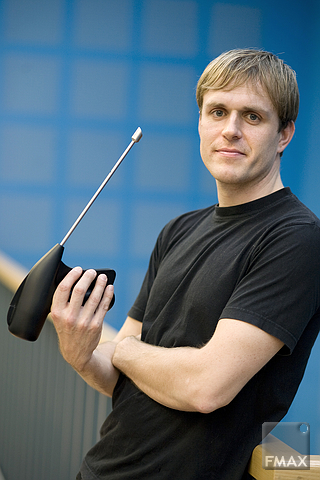Name: Durandus Vonck (31)Nationality: DutchPhD supervisor: Dr. Richard Goosens (Industrial Design Engineering)Subject: Safer surgery with vacuum techniqueThesis defence: In less than two years“Minimal invasive surgery is tricky.
Surgeons can only see what they’re doing on a screen, and the instruments they use make it more complicated. When they try to remove a gallbladder for instance, they use a laparoscopic grasper. This is a tool with which they can grab the bladder. The grasper has sharp ends with notches, which makes it easier to grab the gallbladder or a piece of the slippery intestine. But this is also the reason for many problems during operations. The grasper could damage soft organs in the abdominal area, and this may cause a delayed perforation or an infection that can have severe consequences for the patient. Inexperienced surgeons in particular have a hard time using the grasper.
I am developing a new kind of instrument as an alternative to the laparoscopic grasper. My instrument doesn’t have a grasper, but rather uses vacuum technique. My instrument has suction cups that suck on to the intestine or gallbladder.
It is hard to find the right suction cups, and so I’ve created several. At the moment I’m working with a suction cup that the surgeon attaches to the tissue of the intestine and that sucks the tissue in like a balloon. I’m also working on a new handle. When the surgeon squeezes the handle, the cup attaches itself. The first prototype has a handle that has to be squeezed all the time to suck. Surgeons at the Amsterdam Medical Centre and Catharina Hospital in Eindhoven have tested my instrument, and they complained about the handle. It was tough to squeeze and make complicated moves in the stomach at the same time. Therefore I’m working on a new prototype. The surgeon only has to squeeze once to use the vacuum technology.
Surgeons are enthusiastic about the possibilities of my instrument. They have tested the prototype on intestines of pigs, and the tests went very well. No tissue has been harmed so far, which is important, because it shows that my instrument will be much easier to use for inexperienced surgeons. They also like the instrument because it has such a basic technique, and this makes it easy for them to understand how it works. The surgeons encouraged me to also create a new vacuum technique instrument that will make it possible to stabilise and control an intestine or gallbladder during minimal invasive surgery. Such a tool does not yet exist.
I have high hopes that my instrument will be used in the near future. I’m already in contact with Karl Storz, a German company that develops and manufactures high end tools for surgeons. In January I will present to them two new prototypes with better handles and suction cups.”
Nooit meer een lege brievenbus op Valentijnsdag? Trouw een robot! In 2050 is het mogelijk. Sterker nog: een huwelijk met een robot is dan de normaalste zaak van de wereld. Althans, dat beweert David Levy, succesvol ondernemer en schrijver van het boek Love + Sex with robots, in zijn Studium Generale-lezing.
Levy licht toe hoe een huwelijk met een voorgeprogrammeerde prins op het witte paard een plausibele optie zal worden. “In principe kunnen we vrijwel alle redenen om verliefd te worden voorprogrammeren in een robot. We kunnen zorgen dat de robot op je lijkt, er wild aantrekkelijk uitziet en zich gedraagt alsof hij zijn handen niet van je af kan houden. Houd jij van Chopin? Dan programmeren we de robot zo dat hij speciaal voor jou Preludes kan componeren.” Volgens Levy leiden de huidige technologische en sociologische trends onvermijdelijk tot de brede acceptatie van serieuze relaties met robots. “Robots ogen en bewegen steeds levensechter. De robots van de Japanse professor Ishiguro lijken de eerste tien seconden menselijk. Dit moment zal steeds langer worden, totdat het verschil tussen mens en robot nauwelijks meer te zien is. Bovendien wordt het contact tussen robots en mensen steeds persoonlijker. De eerste robots werkten in de auto-industrie. Tegenwoordig neemt het robothondje Aibo de plaats in van een huisdier. Als je bedenkt dat huisdieren vroeger gezien werden als slaven en je tegenwoordig met je huisdier kunt trouwen op marryyourpet.com, is het logisch te verwachten dat hetzelfde zal gebeuren met robots, die veel meer te bieden hebben dan een huisdier.”
Een robothuwelijk lijkt misschien nog ver weg maar seks met een robot is nabij. Op dit moment zijn er seksspeeltjes op de markt die je als geen ander kunnen verwennen. Het is een kleine stap ze te implementeren in de superrealistische sekspoppen die op grote schaal geproduceerd worden. Een snufje kunstmatige intelligentie erin en een bezoekje aan de wallen wordt overbodig. Levy: “Uit psychologisch onderzoek over betaalde seks blijkt dat de belangrijkste redenen om een prostituee te bezoeken afwisseling, vrijblijvendheid en impopulariteit bij de andere sekse zijn. Dezelfde redeneringen kunnen leiden tot seks met robots, die bovendien geen SOA’s overdragen, zich aanpassen aan jouw wensen en je met hun ingebouwde vibrators in de zevende hemel brengen.”
Desgevraagd ziet Levy één groot nadeel aan robots als sekspartner. “Vooral mannen zullen zich bedreigd voelen door de seksuele kundigheid van de robots. Je krijgt een behoorlijke deuk in je ego als je liefje verzucht dat ze zo heerlijk is klaargekomen bij je robotische concurrent.”
Ondanks dat Levy’s redeneringen wat kort door de bocht zijn, zet hij zijn publiek aan het denken. Toch heeft seks en liefde met medemensen voorlopig de voorkeur. Er gaat immers niets boven goedmaakseks na een menselijke, onredelijke ruzie.



Comments are closed.